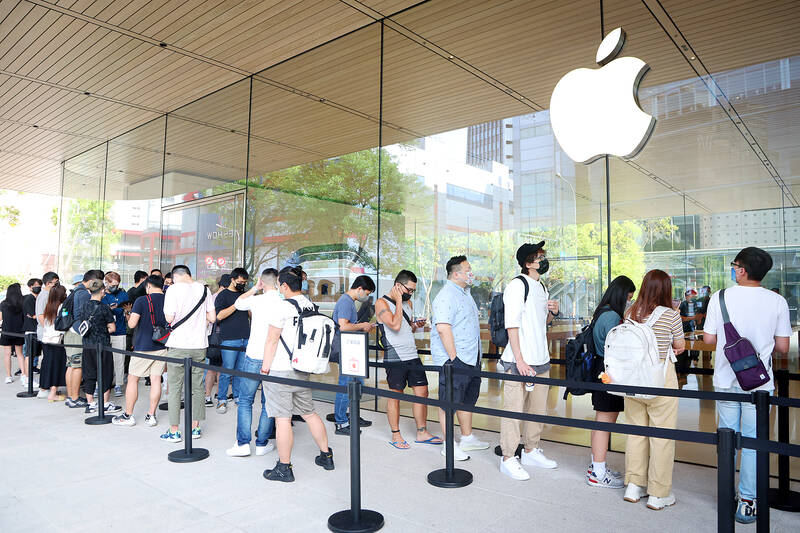Far EasTone Telecommunications Co (遠傳電信) yesterday said that chances are good its 5G subscription penetration rate would reach 30 percent ahead of schedule on the back of strong presale orders of the new iPhone series.
The telecom expects to sell 20 to 30 percent more devices by the end of this year from the iPhone 14 series than the previous-generation iPhone 13 models in the same period last year, as presale orders are nearly double, it said.
Persistent expansion of its 5G subscriber base has made that group about 25 percent of its overall postpaid subscribers, compared with about 20 percent at the end of the second quarter, Far EasTone Telecommunications said.

Photo: CNA
The carrier said that it has a goal of 30 percent 5G subscriptions by Dec. 31.
Its subscribers who use iPhones usually sign long-term contracts averaging 30 months, it said.
This year, most of the contracts signed by people seeking an iPhone 14 phone have top-end subscriptions with a minimum payment of NT$1,399 per month, it said.
Sixty to 70 percent of them have contracts of 36 to 48 months, it said.
The company aims to sell more than 200,000 iPhone 14s by the end of this year, it said, after Chunghwa Telecom Co (中華電信), the nation’s biggest telecom, announced the same target.
The new models generated three times as many presale orders as the company obtained last year when the iPhone 13 models were released, Chunghwa Telecom chairman Sheih Chi-mau (謝繼茂) said.
At the rate the new models are selling, the telecom could sell more than 200,000 of the new iPhones by the end of this year, he said.
The hype surrounding the iPhone 14 might help Chunghwa Telecom hit its target of 30 percent 5G penetration by the end of this year, Sheih said.
The most popular color seems to be purple, followed by starlight, which combined made up 70 percent of presales, Sheih said.
The new devices, which went on sale yesterday, are available in “midnight” (black), purple, “starlight” (white), red and blue.
Taiwan Mobile Co (台灣大哥大) chief business officer Tony Lin (林東閔) said that his firm had received twice as many orders for iPhone 14s during presale as it did last year for iPhone 13s.
About 80 percent of its customers who purchased new iPhones bought the iPhone 14 Pro, which is expected to drive up subscriptions to the company’s 5G plans by 20 to 30 percent, Lin said.
Taiwan Star Telecom Corp (台灣之星) said in a statement that its presales of iPhone 14s have grown 20 percent over presales of iPhone 13s last year.
The most popular color among its customers was purple, followed by blue, and the hottest models were the iPhone 14 Pro and iPhone 14 Pro Max, together accounting for 80 percent of its sales, it said.

When an apartment comes up for rent in Germany’s big cities, hundreds of prospective tenants often queue down the street to view it, but the acute shortage of affordable housing is getting scant attention ahead of today’s snap general election. “Housing is one of the main problems for people, but nobody talks about it, nobody takes it seriously,” said Andreas Ibel, president of Build Europe, an association representing housing developers. Migration and the sluggish economy top the list of voters’ concerns, but analysts say housing policy fails to break through as returns on investment take time to register, making the

NOT TO WORRY: Some people are concerned funds might continue moving out of the country, but the central bank said financial account outflows are not unusual in Taiwan Taiwan’s outbound investments hit a new high last year due to investments made by contract chipmaker Taiwan Semiconductor Manufacturing Co (TSMC, 台積電) and other major manufacturers to boost global expansion, the central bank said on Thursday. The net increase in outbound investments last year reached a record US$21.05 billion, while the net increase in outbound investments by Taiwanese residents reached a record US$31.98 billion, central bank data showed. Chen Fei-wen (陳斐紋), deputy director of the central bank’s Department of Economic Research, said the increase was largely due to TSMC’s efforts to expand production in the US and Japan. Investments by Vanguard International

EARLY TALKS: Measures under consideration include convincing allies to match US curbs, further restricting exports of AI chips or GPUs, and blocking Chinese investments US President Donald Trump’s administration is sketching out tougher versions of US semiconductor curbs and pressuring key allies to escalate their restrictions on China’s chip industry, an early indication the new US president plans to expand efforts that began under former US president Joe Biden to limit Beijing’s technological prowess. Trump officials recently met with their Japanese and Dutch counterparts about restricting Tokyo Electron Ltd and ASML Holding NV engineers from maintaining semiconductor gear in China, people familiar with the matter said. The aim, which was also a priority for Biden, is to see key allies match China curbs the US

STRUGGLING TO SURVIVE: The group is proposing a consortium of investors, with Tesla as the largest backer, and possibly a minority investment by Hon Hai Precision Nissan Motor Co shares jumped after the Financial Times reported that a high-level Japanese group has drawn up plans to seek investment from Elon Musk’s Tesla Inc to aid the struggling automaker. The group believes the electric vehicle (EV) maker is interested in acquiring Nissan’s plants in the US, the newspaper reported, citing people it did not identify. The proposal envisions a consortium of investors, with Tesla as the largest backer, but also includes the possibility of a minority investment by Hon Hai Precision Industry Co (鴻海精密) to prevent a full takeover by the Apple supplier, the report said. The group is